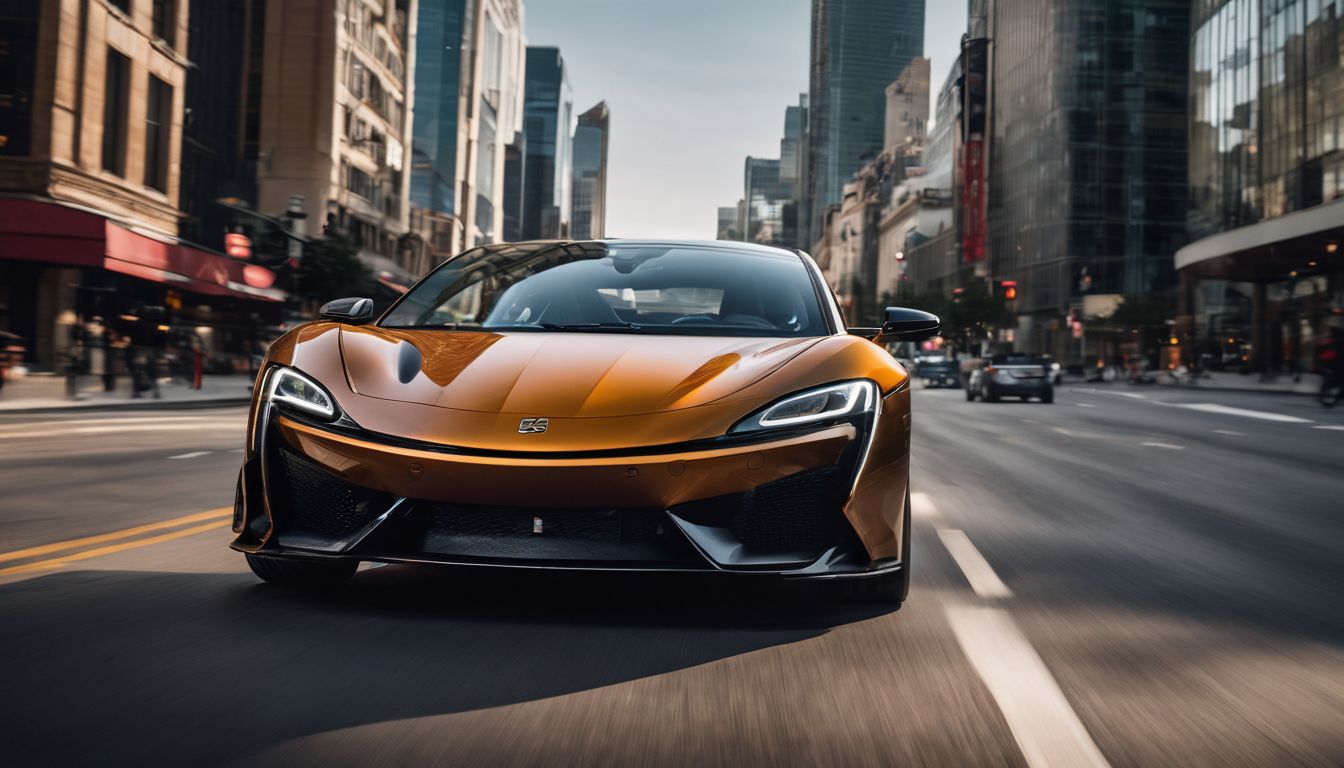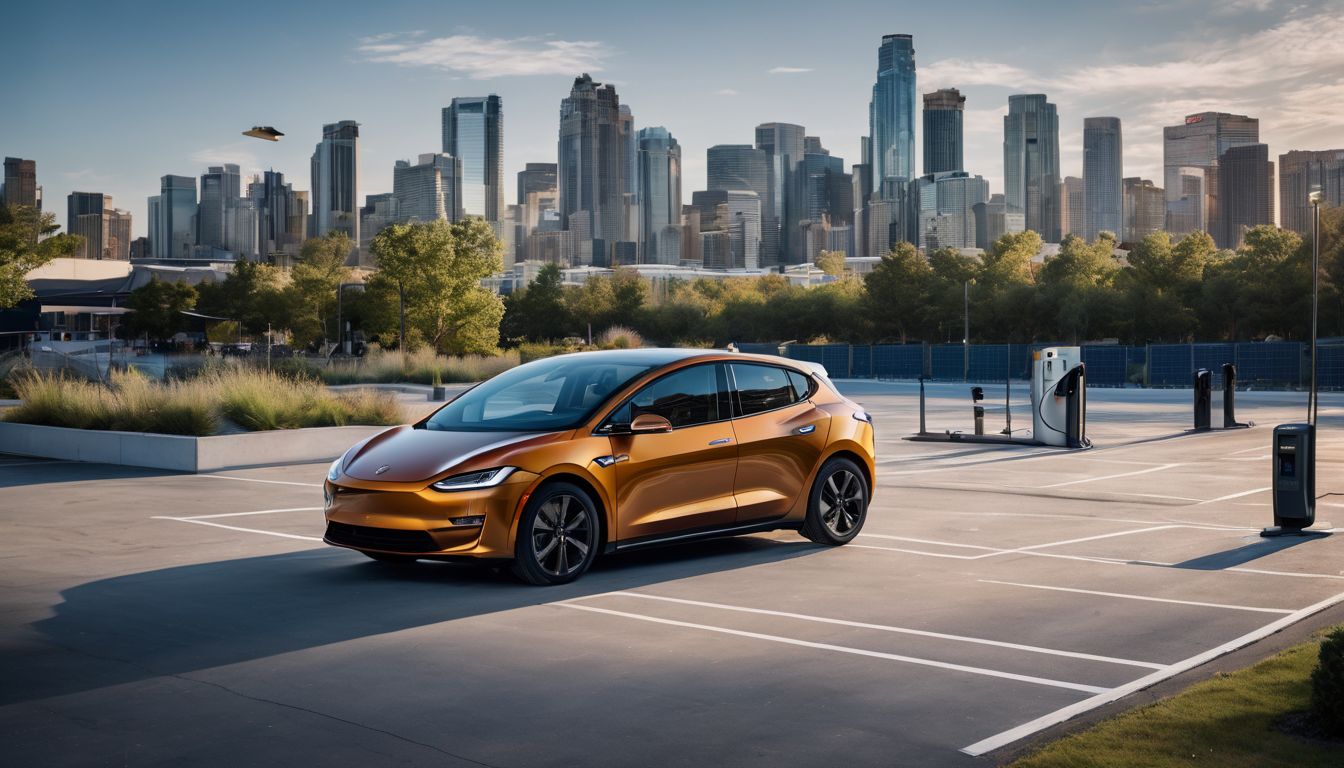As we come to terms with the stark impact of climate change, many of us find ourselves wrestling with the guilt associated with our cherished petrol cars. You’re certainly not in isolation; that twinge of eco-concern when topping up at the pump is a shared experience.
Through our research, we’ve delved into how the automotive sector is transitioning away from traditional fuels towards electric vehicles (EVs) and what this heralds for us – both as conscientious drivers and guardians of our environment.
Explore with us as we navigate the future trajectory for fuel-powered transport—read further!
Key Takeaways
- Automakers are rapidly developing electric vehicles (EVs) to meet consumer demand for sustainability and comply with tough environmental regulations.
- Despite the popularity of gas cars, advancements in EV technology and increasing charging infrastructure signal a shift away from fossil fuels.
- European countries are leading the push towards EV adoption, influencing global automotive strategies and creating a ripple effect in other regions.
- The transition to electric vehicles faces challenges such as expanding the charging network, improving battery technology, and managing economic impacts on traditional automakers.
- Consumer preferences are aligning more with environmentally friendly transportation options like EVs, potentially reducing the market for gasoline cars post-2035.
Current State of Gas-Powered Vehicles
Automakers are heavily investing in electric vehicles (EVs), but gas-powered cars still dominate the market. The popularity of gas cars remains high, despite the increasing interest in EVs.
Automakers investing in EVs
We’re seeing a major shift as automakers funnel resources into developing electric vehicles (EVs). Driven by consumer demands for sustainability and stringent environmental regulations, the industry’s giants are mapping out their paths to an all-electric future.
They’re launching new EV models, enhancing battery technology, and investing heavily in the infrastructure needed to support these cleaner cars.
Our drive towards renewable energy plays a key role in this transition. Car makers understand that sticking with gasoline engines won’t align with global efforts to reduce carbon emissions.
So they’re innovating rapidly, creating EVs that not only rival but surpass the performance of traditional petrol-based vehicles. The commitment is clear; we’re steering away from fossil fuels and accelerating into an era where electric cars are the standard on our roads.
The popularity of gas cars
Gas-powered vehicles have been a popular choice for decades, offering reliable performance and established infrastructure. Consumers have long favoured the convenience of gasoline cars due to their widespread availability and familiar refuelling process.
Despite growing awareness of environmental concerns, such as carbon emissions and climate change, many continue to opt for gas engine cars over alternative fuel technologies. This enduring popularity has created challenges for the transition to electric vehicles (EVs) and other sustainable transport options.
Consumers’ preference for gasoline cars presents a significant obstacle in achieving broader adoption of EVs and phasing out internal combustion engines. It also underscores the importance of accelerating efforts to educate consumers about the benefits of transitioning towards more fuel-efficient and environmentally friendly alternatives in the automotive industry.
Phasing Out Gasoline Cars
As we move towards a greener future, the automotive industry is making strides in phasing out gasoline cars and transitioning to electric vehicles. This evolution is driven by environmental concerns, advancements in technology, and government mandates aimed at reducing carbon emissions.
Evolution towards EVs
The automotive industry is evolving towards electric vehicles (EVs) primarily due to the growing environmental concerns and the need for sustainable transportation options. This transition is being driven by several factors, including advancements in battery technology, stricter emission regulations, and consumer demand for cleaner and greener transportation solutions.
- Advancements in Battery Technology: The development of more efficient and cost-effective batteries has significantly improved the range and performance of EVs, making them a more viable option for consumers.
- Stricter Emission Regulations: Governments worldwide are implementing stringent regulations to reduce greenhouse gas emissions from vehicles, incentivizing automakers to shift their focus towards producing EVs to comply with these standards.
- Consumer Demand for Cleaner Transportation: Growing awareness about environmental issues has led consumers to seek out vehicles that have a lower impact on the environment, driving up demand for EVs as an alternative to traditional gasoline-powered cars.
- Expansion of Charging Infrastructure: The widespread deployment of charging stations across various regions is making it more convenient for consumers to own and operate EVs, alleviating concerns about range anxiety.
- Economic Incentives: Governments are offering financial incentives such as tax credits and rebates to encourage consumers to purchase EVs, further bolstering their appeal in the market.
Reasons behind the shift
Automakers are shifting towards electric vehicles due to the need for sustainable transportation. The push towards EVs is driven by stricter government regulations and a global commitment to reduce carbon emissions.
Consumers are also showing increased interest in environmentally friendly options, leading automakers to invest in eco-friendly technology.
The move away from gasoline cars is also motivated by advancements in battery technology and the growing infrastructure for electric vehicles. This transition aligns with the automotive industry’s goal of promoting fuel efficiency and reducing dependence on petroleum-based fuels.
Challenges and Implications
Ripple effect in Europe as countries push for electric vehicle adoption. Potential issues with the transition from gasoline to electric vehicles, including infrastructure challenges and cost concerns.
Future of gasoline cars post-2035 remains uncertain amidst shifting consumer preferences and government regulations.
Ripple effect in Europe
The shift towards electric vehicles in Europe is causing a ripple effect in the automotive industry. As more countries announce plans to phase out gasoline cars, automakers are adapting their strategies to focus on producing electric and hybrid vehicles.
This change not only impacts the production of cars but also influences infrastructure development, such as charging stations and battery technology. Additionally, it brings about opportunities for innovation and economic growth within the renewable energy sector.
As European nations take steps towards sustainability by reducing reliance on gasoline-powered vehicles, other regions may feel compelled to follow suit. The ripple effect of this transition goes beyond environmental impact; it has implications for job markets, consumer behaviour, and international trade dynamics.
Potential issues with the transition
As we look ahead, it’s crucial to consider the potential issues associated with the transition from petrol-powered vehicles to electric ones. Here are some critical points to bear in mind:
- Infrastructure Challenges: Expanding the charging infrastructure and ensuring its accessibility will be a significant hurdle for widespread adoption of electric vehicles, particularly in rural areas.
- Battery Technology and Range Anxiety: While advancements in battery technology continue, concerns surrounding the range of electric vehicles and the availability of fast-charging stations persist.
- Supply Chain and Raw Materials: The shift towards EVs raises questions about sustainable sourcing of raw materials for batteries and the environmental impact of increased production.
- Economic Impact on Traditional Automakers: Adapting to produce electric vehicles requires substantial investment, potentially impacting traditional automakers’ profitability and workforce.
- Consumer Awareness and Education: A concerted effort is needed to educate consumers about the benefits of electric vehicles, dispelling misconceptions and addressing concerns over vehicle cost, performance, and maintenance.
- Policy and Regulation Alignment: Harmonising policies to support EV adoption while addressing potential loss of revenue from petrol taxes poses a complex challenge for governments.
- Environmental Implications: Widespread electrification of transportation brings attention to managing end-of-life disposal of batteries and minimising overall environmental impact throughout a vehicle’s lifecycle.
Future of gasoline cars post-2035
Despite the challenges ahead, the future for gasoline cars post-2035 looks uncertain. With increasing environmental concerns and government regulations favouring electric vehicles (EVs), the longevity of traditional petrol-powered cars is in question.
As automakers continue to shift their focus towards sustainable alternatives, it’s evident that the fate of gasoline cars hangs in the balance.
Consumers are also demonstrating a growing preference for EVs due to advancements in technology and an increased emphasis on sustainability. This evolving trend could significantly impact both the petroleum industry and consumer choices when it comes to transportation.
Final Thoughts and Conclusion
Phasing out gas-powered vehicles is a complex and multifaceted process, requiring collaboration between governments, automakers, and consumers. The evolution towards electric vehicles presents both challenges and opportunities for the automotive industry.
Ultimately, the future of gasoline cars post-2035 will be shaped by advancements in technology, consumer preferences, and government regulations. As we navigate this transition, it’s crucial to consider the broader implications for sustainability in the automotive industry.
This shift represents a significant step towards reducing our reliance on fossil fuels and supporting environmental conservation efforts.
FAQs
1. Will gasoline-powered vehicles still be around in the future?
In the automotive industry, gasoline-powered cars are being reconsidered due to sustainability goals, with a push towards electric vehicles and government regulations that may phase out gas cars.
2. How are advancements in fuel efficiency affecting gasoline vehicles?
Advancements in fuel efficiency improve how far gasoline-powered vehicles can travel on a single tank of fuel, but they must compete with the growing preference for electric cars.
3. What impact do electric vehicles have on the future of gasoline cars?
Electric vehicles are gaining popularity and could lead to fewer petroleum-based cars on the road, impacting the overall future of fossil fuel vehicles.
4. Are governments regulating gasoline-powered vehicles?
Governments worldwide introduce regulations aimed at reducing emissions from gas-powered vehicles, which might include restrictions or bans in certain areas to encourage cleaner transportation options.
5. Do consumers prefer electric over gasoline cars nowadays?
Consumer preferences are gradually shifting towards electric versus gasoline cars because of factors like rising gasoline prices and a growing awareness of environmental issues linked to petrol engines.





